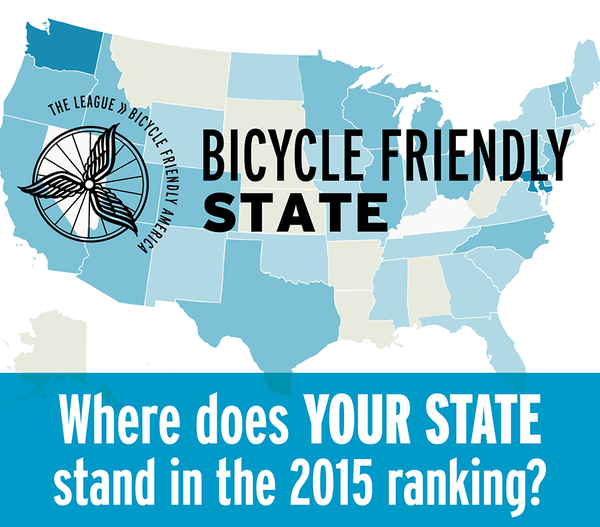The League of American Bicyclists released its annual bike-friendly state rankings, and two Great Lakes states broke the top 10 again.
Minnesota retained its second place spot, but Wisconsin dropped from third to ninth. Three Great Lakes states dropped in the rankings, two improved and three stayed the same.
Part of The League’s Bicycle Friendly America program, rankings are based on a five-subject survey completed by state departments of transportation and state bicycling advocates.
States are ranked on legislation and enforcement, policies and programs, infrastructure and funding, education and encouragement, evaluation and planning.
States are scored out of 100 points, and each is provided a report card, including criteria for the “Top 10 Signs of Success.”
Here is how each Great Lakes state ranked with an explanation from the report.
Minnesota (#2)
Minnesota and Wisconsin have consistently battled Washington for the top ranked bicycle friendly state. But Minnesota has held a top-five spot since 2008, a feat no other state can claim but Washington, which ranked first in the nation this year.

Nice Ride is a non-profit bike sharing system in Minnesota. Image: Flickr
With eight of 10 signs of success, including the new “bicycle safety emphasis” in its strategic highway safety plan, Minnesota continues its battle for the top spot.
Minneapolis already boasts the most bike-friendly city in the country, according to a Redfin report.
The League highlights Minnesota’s infrastructure and funding improvements, but suggests improving connectivity between urban streets and rural trails to support access to retail, work and education.
The gap between the first and second place has decreased since 2013, allowing Minnesota a fighting chance at number one in 2016.
Wisconsin (#9)
Wisconsin has had a rough ride near the top. Ranked second from 2008 to 2010, the state is inconsistent when it comes to bikeability.
It dropped six places from last year, and might suffer in the rankings next year as Wisconsin Gov. Scott Walker intends to repeal the Complete Streets law, which mandates that cyclists and pedestrians are considered when roads are built with state or federal funds.
The Complete Streets policy is one of the ten signs of success evaluated in The League’s report card.
This year, however, Wisconsin’s bike-friendly ranking dropped due to broad declines in cycling legislation and enforcement, as well as policy and program implementation.
Pennsylvania (#12)
Pennsylvania climbed from 19 to 12 in the rankings this year, making it the region’s most improved. That’s due largely to the state’s adoption of Act 89 in 2013, which established a state fund contributing no less than $2 million to bicycle and pedestrian projects.
Post-Act 89 momentum and other cycling successes have allowed the state to improve its scores in the policies and programs and infrastructure and funding categories.
But to continue its climb from a 42 ranking in 2010, The League suggests adding new bicycle and pedestrian staff within the Pennsylvania’s Department of Transportation to better implement cycling projects and to separate state and municipal responsibilities.
Illinois (#14)
Illinois has consistently ranked near the top 10 of bike-friendly states but dropped three places this year.
Despite the recent adoption of a state bicycle plan, and a sixth place ranking for Chicago’s bikeability, the Illinois’ score in policies and programs dropped. And to regain it’s top 10 ranking, The League suggests hiring a coordinator to implement the bicycle transportation plan, as well as taking advantage of existing projects that have room for bicycle-integration, such as bike lanes or paved shoulders.

Biking Chicago. Image: Flickr, Steven Vance
Ohio (#16)
Ohio retained its place at number 16. Jumping from a 32- to 16-ranking from 2013 to 2014, Ohio continues to benefit from an increase in bicycle infrastructure and funding.
Yet the state lacks some common features shared among the top bike friendly states, including a safe passing law and Complete Streets policy.
The League suggests Ohio adopt a statewide bicycle plan and designate an advisory committee “to provide accountability for bicycle projects and programs.”
Michigan (#18)
Michigan continues its descent from 12th place in 2013, dropping an additional four places from 2014 to 2015.
While it gained some points in evaluation and planning, Michigan still lacks a comprehensive state bicycle plan and safety plan, including a safe passing law, a vulnerable road user law and a law that prohibits motorists from opening their vehicle door unless it is safe to do so.
While The League points out that bicycle safety needs to be emphasized, they also suggest Michigan incentivize existing local bike policy, like Complete Streets.
New York (#29)
New York placed number 29 for a second year in a row, and after climbing out of a 43-ranking in 2013, the state has room for improvement.
According to The League, New York suffers most from poor evaluation and planning, due, in part, to the state’s outdated bike plan.
To continue moving toward the more bike friendly half of the states, The League suggests New York dedicate state funding to bike projects, programs and evaluation.
The creation of an advisory committee could also help to update the state’s bicycle plan and safety measures.
Indiana (#37)
Indiana is the lowest ranked Great Lakes contender for bike-friendly states.
Despite a 5-place jump from last year and the implementation of a Complete Streets policy, Indiana suffers low scores in each of The League’s five evaluation categories.
The League points out that improvement in policy and program planning, as well as evaluation might push the state in the right direction.
This includes improvements in bike safety and connectivity, which The League says can help integrate bike-friendly strategies into existing transportation and land use policy.
